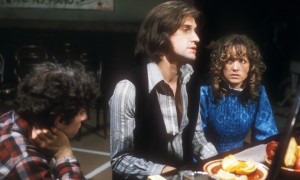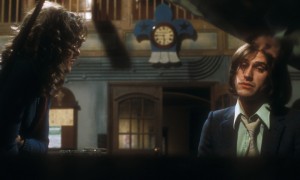 |
 |
A dingy municipal hall in a nondescript northern town plays host to Pete (Ray Davies) a phenomenon, a true one-off of Herculean proportions – at least, according to his loudmouth, cod-American manager Jack Burnshaw (Norman Rossington). Over the next few days, as Jack barks at nonplussed townsfolk through a megaphone while his gofer Alf (James ‘Red Shift’ Hazeldine) bangs resignedly on a drum, Pete will be attempting to break the record for non-stop piano playing. Why, apart from the ‘uniqueness’ of the achievement, no-one can be quite sure, least of all Pete’s long-suffering wife Ruth (Lois Daine) holed up in a makeshift bedroom for the duration, within earshot of the relentless drone of Pete’s playing. Locals seem none to bothered either – two old duffers dusting down the snooker tables in the hall chat idly about him because – well, he’s being talked about, apparently. Audience members come to witness the freak, make fun and shout out confusing requests. Much speculation on either of the couple ‘going without’ while the marathon continues is loudly made.
A gang of youths headed by Ken ‘Just a Boy’s Game’ Hutchison intimidate Pete’s girl and break into the hall at night, almost forcing Pete to stop until Jack storms in and beats them into submission. But as time passes, and Pete’s playing slips from a medley of recognisable tunes into a relentless atonal stew, things fall apart of their own accord. Ruth demands he choose between his pointless record attempt and her. Doesn’t he love her? Pete’s reply is as incoherent as his playing. Then she confronts Jack about his exploitation, but Jack, his transatlantic accent slipping as he tenses, remains adamant that he is the only one who matters to Pete. And so the marathon wears on, with Pete’s fingers bandaged, and shaves and sponge baths taken in situ with the help of the ever-eager Alf. Finally, however, Pete snaps, and puts down his bandaged hands, running past an irate Jack to fall – rather spectacularly by way of the fire escape – into Ruth’s arms.Weatherbeaten and wasted, he takes the promise of life over empty achievement in the end.
Writer Alan Sharp freely admitted this story was based on Horace McCoy’s depression-era novel They Shoot Horses, Don’t They?, which was coincidentally being made into a Hollywood film at the same time this was in production (an earlier radio version of the play predates the film entirely). The play shares with that film the same flaw in its one-note allegory – how easy is it to care for the characters, or try and anticipate their moves, once the metaphor has been set in motion? Davies, while certainly no revelation in the acting stakes, does at least come into his own as the days wear him down – when he sings to Alf a giddy, weary song Marathon (an original Davies composition for the film) the flight from sanity is clearly underway. Lois Daine copes well with her scenes, especially the showdown with Jack, in which Norman Rossington also proves himself a capable actor above and beyond the comic turn his mutton-chopped, tight-pullover-wearing demagogue seems in the early scenes.
As appropriate to a story concerning the balance on the razor edge of sanity, wayward director Philip Saville turns in one of his more ‘together’ productions, brilliantly racking up the claustrophobic tension in the interior scenes, and photographing the back-to-back terrace locations with a sharp eye for their relentless, maze-like oppression. (The exercise bars folded into the walls of the hall-cum-gym are likewise framed to give a sense of Pete being a ‘caged animal’, fortunately without the point being rammed home too forcefully.) Only twice does the over-exuberance that would later scupper overblown outings like The Rainbirds (qv) surface – a short Bunuel rip-off fantasy sequence showing Pete dragging a piano up a hill, and a final piece of film footage showing a fox racing through woodland, to illustrate a rather half-baked bit of symbolism from earlier in the story (Pete had been repeatedly babbling about ‘seeing a fox once’ to Alf). While this first outing for the renamed strand is far from a classic, and doesn’t provide a great deal to think about after the credits have rolled past to the strains of the Kinks’ Got to Be Free, the atmosphere of the piece is undeniably affecting, and there’s certainly more to recommend it than mere curiosity at seeing Ray Davies act.



















